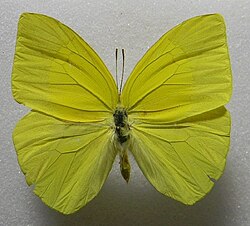| Rhabdodryas | |
|---|---|
 | |
| At the Cristalino River, Southern Amazon, Brazil | |
 | |
| Scientific classification | |
| Kingdom: | Animalia |
| Phylum: | Arthropoda |
| Class: | Insecta |
| Order: | Lepidoptera |
| Family: | Pieridae |
| Subfamily: | Coliadinae |
| Tribe: | Coliadini |
| Genus: | Rhabdodryas Godman & Salvin, [1889] [1] |
| Species: | R. trite |
| Binomial name | |
| Rhabdodryas trite (Linnaeus, 1758) | |
Rhabdodryas is a genus of butterflies in the family Pieridae. The only species is the straight-line sulphur (Rhabdodryas trite).
R. trite puddles with other yellows and sulphurs including the statira sulphur ( Aphrissa statira ) and apricot sulphur ( Phoebis argante ); and orange-banded sulphur ( Phoebis philea ).
- Puddling, Cristalino River
Southern Amazon, Brazil - Puddling, Cristalino River

